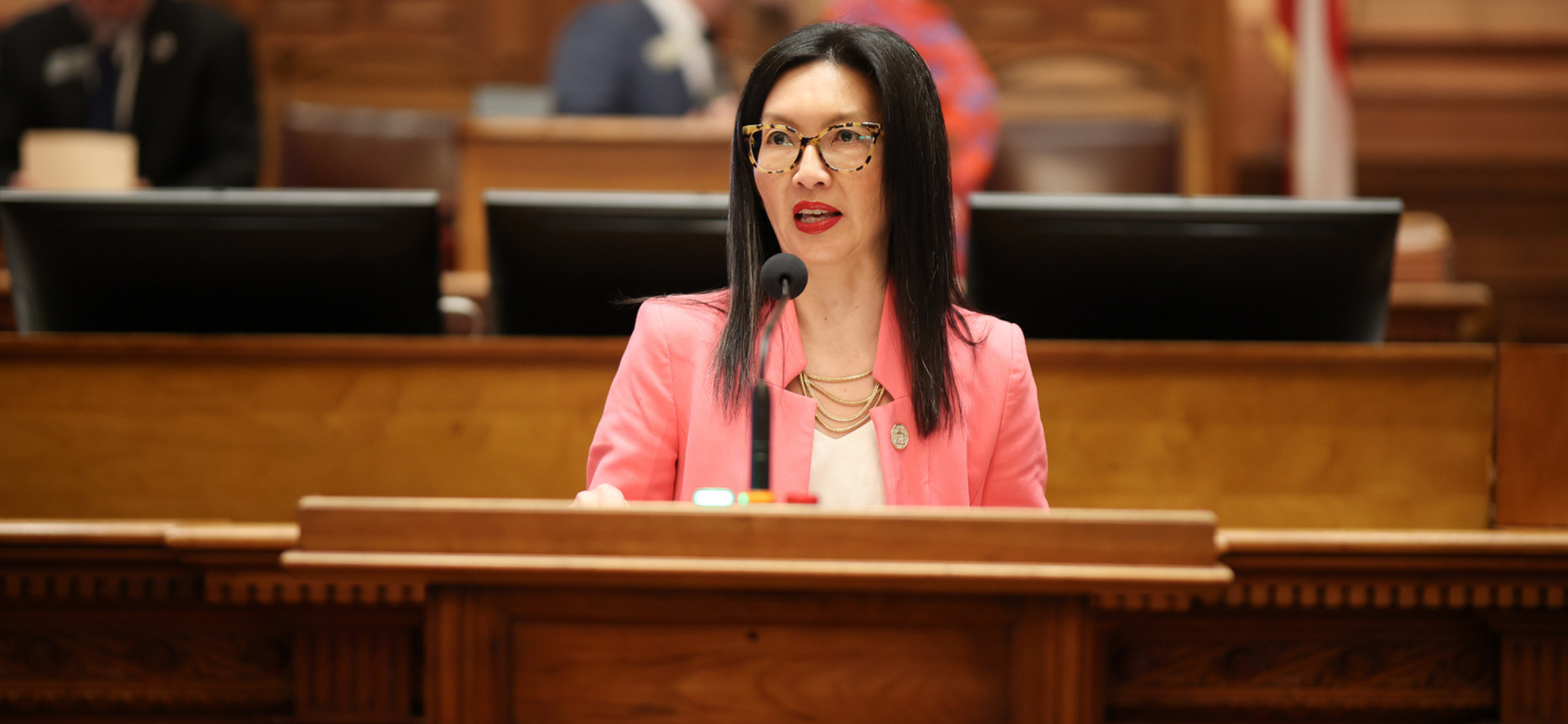Stay ahead of the curve as a political insider with deep policy analysis, daily briefings and policy-shaping tools.
Request a DemoBills to expand hospitals, protect renters, honor former slaves move in Legislature

Rep. Michelle Au was among Democrats who spoke against a bill to limit investment by foreign-owned companies in Georgia agricultural land.(Credit: Georgia House)
Georgia lawmakers passed bills this week to expedite hospital construction, create a private school voucher program, monitor undocumented immigrants and reignite gender-based culture wars.
As often happens on the homestretch of the legislative session, which ends March 28, legislators used sleight of hand maneuvers to advance some bills.
Among the ‘Frankenstein bills’ containing parts of bills that were otherwise dead — because they didn’t make the Crossover Day deadline on Feb. 29, mashed together with bills that did make the deadline, was House Bill 1170. Originally aimed to provide drug overdose reversal kits in schools and public buildings, it was hijacked by a Senate committee to include provisions to ban puberty-blocking medications for transgender minors.
The Senate passed House Bill 301, which began as a bill to increase penalties for illegally passing school buses and was later loaded with language to penalize local governments for acting as ‘sanctuary cities’ for illegal immigrants. The bill would impose financial punishments on law enforcement agencies and local governments the state considers to have policies or practices that violate state and federal immigration law. It also gives any state resident the right to sue local governments for not enforcing such laws.
House Bill 1104, providing mental health resources and counseling to high school athletes, was turned by a Senate committee into a bill banning transgender youth from participating in girls’ sports and from accessing school bathrooms, and requiring schools to tell parents what books their children check out from school libraries. The Senate is expected to vote on it next week.
The Senate Finance Committee made changes to House Bill 170, authored by Rep. Kasey Carpenter, R-Dalton. The bill was originally a tax sales and tax use exemption for specified digital works items but was gutted by Sen. Jason Anavitarte, R-Powder Springs, and it now includes parts of Senate Bill 344, adding a sales tax holiday for hunters and exempting sales of firearms, ammunition, gun safes, trigger locks, and related accessories during five days in October each year.
Lawmakers still have three working days left before Sine Die, the final day of the 2024 session, next Thursday.
Here are some highlights from this week under the Gold Dome:
In the House
- The House voted 96-78 along party lines to approve Senate Bill 362, which would deny state tax credits to companies that voluntarily recognize unions through a check of signed union cards rather than through a secret ballot election. Companies would also be punished for sharing their workers’ contact information with unions. Democrats decried both provisions as being in conflict with what federal law requires and said it would invite litigation. It now goes to the governor for consideration.
- After vigorous debate, the House passed Senate Bill 420, which bans foreign adversaries from buying farmland or land near military bases in Georgia. Opponents called the bill, which passed 97-67, xenophobic and said it would invite lawsuits and federal fair housing challenges. It now goes to the governor.
- The House passed Senate Bill 426, Lt. Gov. Burt Jones’ tort reform priority legislation. The bill, sponsored by Sen. Blake Tillery, R-Vidalia, limits the ability of plaintiffs to sue motor carriers and their insurers simultaneously, commonly known as “direct action.”
- The House passed SB 480 which provides student loan repayments for mental health and substance abuse professionals who work with underserved youth or who work in certain areas of the state in great need of behavioral health professionals. In presenting the bill, Rep. Sharon Cooper, R-Marietta said, “We just flat out don’t have enough people to take care of” Georgians with mental health issues. Rep. Ruwa Romman, D-Duluth, said fentanyl- and opioid-related deaths and overdoses “have skyrocketed” and “bills like this give us an important tool to address these crises” by helping to recruit and retain addiction specialists and other mental health professionals who have high student loan debt but receive low pay in Georgia. The bill passed 167-2 and now goes to the governor for consideration.
- Senate Bill 456 is meant to give peace of mind to people who hire home health aides to care for their disabled family members. The bill would add persons with physical or mental disabilities to the purview of the Central Caregiver Registry, which presently partners with the FBI to do background checks on those who care for the elderly in residences. It passed the House 168-0 and now goes to the governor.
- The House and Senate passed House Bill 1425, landmark legislation intended to preserve the legacy of the Weeping Heritage Corridor where 429 enslaved people were sold in Savannah on March 2-3, 1859. The bill, which creates the Weeping Time Cultural Heritage Corridor Authority, was introduced by Rep. Carl Gilliard, chairman of the Georgia Black Legislative Caucus. It now goes to the governor for his consideration.
In the Senate
Each of the following bills are on the way to the governor’s desk for his consideration.
- The Senate and House gave final passage Thursday to House Bill 1339, legislation that updates Georgia’s outdated Certificate of Need laws. The bill, which now heads to Gov. Brian Kemp, allows Morehouse School of Medicine to open a hospital in a badly-needed area of Atlanta that saw the closure of Atlanta Medical Center. The bill also enables a hospital to open without a permit in any rural county where a hospital has been closed for more than a year. Before the passage of the bill, however, Democrats rallied for one last-ditch effort to expand Medicaid. A Senate committee heard testimony about a proposed bill that would have created a Medicaid-style program called PeachCare Plus. It was narrowly defeated, essentially ending any hope of seeing Medicaid expansion this legislative session.
- As expected, the Senate passed its long-sought private school voucher bill, which would provide some Georgia families with children with $6,500 per student per year for private school tuition or homeschooling expenses. The children must attend public schools in the bottom 25% of lowest-performing districts in the state for at least one year, or be rising kindergarteners in those districts.
- House Bill 663, the No Patient Left Alone Act, which mandates that parents can visit a hospitalized child, or at least one designated person can visit a hospitalized adult, passed the Senate by a vote of 49-0. It was created in response to rules at many hospitals that prevented relatives from visiting people who were sick and dying from COVID-19 at the height of the pandemic.
- The Senate passed House Bill 1410, which would create a stable housing accountability program to provide voluntary and immediate housing to homeless persons for up to 18 months while helping them secure permanent housing. It also amends who appoints members to the State Trust Fund for the Homeless Commission. The bill will allow the trust fund to receive state, federal and private funds to provide housing and services to the homeless, which is expected to considerably grow available funds. The bill passed 45-1.
- House Bill 51 would allow local school districts to transport students to and from school and school-related activities in school-owned vehicles with a capacity of five to eight persons, instead of in school buses. It’s aimed in part to help districts where bus drivers who hold commercial driver’s licenses are in short supply. The bill passed in the House last year and was tabled by the Senate, which took it up this week and passed it 50-1.
- A newly divorced woman who wants to use her maiden name will now be able to do that without problem. The Senate passed House Bill 896 which provides additional means for changing a person’s married surname to their previous surname after receiving a divorce decree.
- The Senate passed House Bill 1105, the Georgia Criminal Alien Track and Report Act, requiring law enforcement to enforce federal immigration laws. The vote passed along party lines, 34-19. This bill gained momentum after an Augusta University nursing student was killed in Athens last month.
- The Senate passed Senate Bill 465 — Austin’s Law —which goes after those who make or sell fentanyl and charges them with a felony offense of aggravated involuntary manslaughter if their distribution results in someone’s death. In 2022, nearly 2,000 Georgians died from overdosing on fentanyl, a synthetic opioid that is 50 to 100 times more potent than morphine.
- A new Juvenile Treatment Court Division will be established through House Bill 873, which will provide “alternative adjudication” to youth charged with delinquency or offenses or who need services due to addiction, truancy or running away from home. It will be managed by the Council of Accountability Court Judges, which oversees adult accountability courts. Like those for adults, the juvenile treatment courts would provide addiction and mental health treatment, with a goal of keeping kids in school and connected to their families instead of detention or incarceration. The program also aims to prevent and reduce gang involvement. The bill passed 52-0.
- House Bill 827 makes entering into the cage or enclosure of a wild animal at a zoo or other venue where land or sea animals are kept for public visitation an act of criminal trespass. If the animal is injured or killed, sentences range from one to 10 years. The bill also increases fines for stealing livestock to $10,000 from $1,000, and ups the maximum sentence to 15 years from 10 years. It passed in the Senate 52-0.
And this bill made major progress:
House Bill 404, known as the Safe at Home Act, passed in the Senate 44-2. It requires rental property be “fit for human habitation” and for landlords to give tenants who are behind on rent, utilities or other fees three days’ written notice before filing an eviction action. It also forbids landlords from shutting off cooling and other utilities to force a renter out, and caps security deposits at two months’ rent. The Senate updated its effective date to July 1, 2024, so the amended bill will return to the House for another vote, where it is expected to pass.
In other news

Read these related stories:
Correction: This story has been updated to correct the status of House Bill 404. Because the Senate amended its effective date, the amended bill is expected to be voted on in the House next week, and not sent directly to the governor.
Have questions or comments? Contact Jill Jordan Sieder on X @journalistajill or at [email protected] and Tammy Joyner on X @lvjoyner or at [email protected].
And subscribe to State Affairs so you do not miss an update.
X @StateAffairsGA
Instagram@StateAffairsGA
Facebook @StateAffairsGA
LinkedIn @StateAffairs
Newly minted Senate Minority Leader Harold Jones II: ‘I’m not the typical back-slapping politician’
Nearly 10 years into legislative life, Sen. Harold Jones II wouldn’t change anything about the experience. “I love every minute of it. Even when I hate it, I love it,” the 55-year-old Augusta Democrat told State Affairs. Come January, Jones will add another role to his legislative duties: Senate minority leader, a job held for …
Gov. Kemp calls on state agencies to be fiscally restrained amid record $16.5B surplus
The Gist Gov. Brian Kemp asked the state’s 51 government agencies for continued fiscal restraint when drafting their amended fiscal year 2025 and 2026 budgets. Most agencies adhered to his request even as the state’s general fund surplus hit a record $16.5 billion last month. Forty-five agencies, excluding state courts, followed the governor’s instructions to …
Georgia defies bomb threats as election chief declares a “free, fair and fast” vote amid record turnout
ATLANTA – Despite dealing with over 60 bomb threats, Georgia’s election chief said Tuesday the state’s general election went smoothly. Georgia had a record turnout with nearly 5.3 million people voting, Secretary of State Brad Raffensperger told reporters. Election officials in the state’s 159 counties have until 5 p.m. to certify votes. “We had a …
In the (state)house: Meet the newest members of the Georgia legislature
When lawmakers reconvene at the state Capitol on Jan. 13, there’ll be a cadre of new faces in the 236-member Georgia General Assembly, one of the nation’s largest state legislatures. All 236 statehouse seats were up for election this year. Most candidates ran unopposed. Incumbents in contested races easily kept their seats, with the exception …



